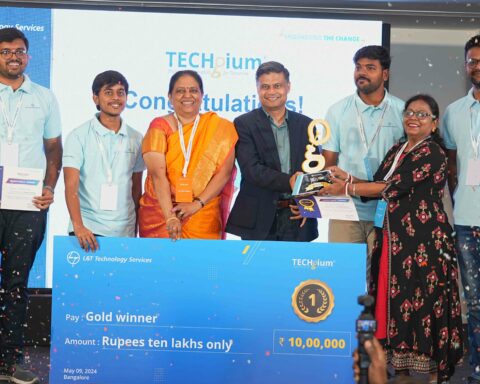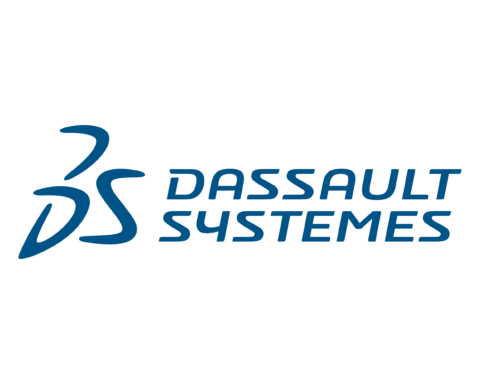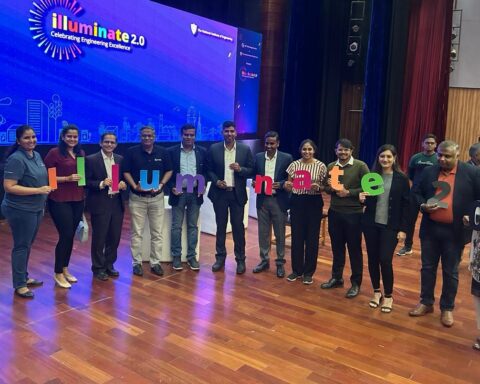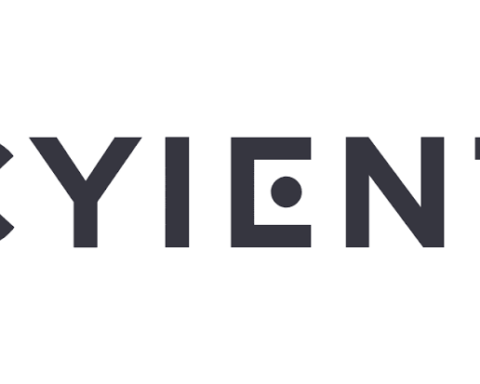Interview with Mr. Sanjeev Nikore
Jahnavi- Considering you had represented HCL Technologies at WEF Davos, how were you able to inculcate the experience gained from here in the future programs altogether?
Sanjeev Nikore – Basically, there were two different occasions when I had represented HCL technology, we learnt a lot about climate change, sustainability, energy efficiency and various problems that the world is facing. So I think we bought it out in a way that we manage this technology in the HCL technologies. the HCL technology is also now adopting new and sustainable ways for the consuming of the energy which is at one level, and the second one is in terms of how we tend to manage a lot of data centrals. In both the areas we were able to bring about some kind of lessons from world economic forum. We had a lot of ideas in terms of digital transformation. That were discussed there itself whether related to AI machine learning or anything else. We also got to know what the government is thinking about new ways of doing things. I think there are multiple experiences there and so I cannot pin down and say that one experience lead to something very specific but it was an overall thing.
Jahnavi- There have been immense amount of the increase in the EV ecosystem in the current world, how do you think it will benefit everyone in the future? Do you think it might end up failing in some criterias?
Sanjeev Nikore – So, at the moment this is the very best option available from the perspective of reducing the carbon footprint. As we all know that we are already touching the 1.5° global warming mark and the pollution level in many city‘s in India, including Delhi, Jaipur or extremely high. The AQI was almost 400 and so it’s not sustainable at all. About 16% of the emissions are caused by the vehicle or traffic. Essentially what we need to do is to quickly come out with some kind of technology and that’s where the EV offers a very big advantage. Now as you said the flip side, there are a lot of advantages, but at the same time the increase in the electricity consumption from the poll, based plants as there is about 74% of the electricity generation today then it is surely not going to help in the long run. So what we need to do is to combine the EV which solar and other kind of renewable forms of energy. Even though this is already happening, this needs to be accelerated. We are having almost 40% generation of energy from other sources.
So that is the factor that we need to guard against and secondly from the lithium perspective, today the batteries are lithium and it is in short supply. So what we need here to do is the recycling of the lithium batteries if we are able to recycle the lithium batteries then we don’t really need to worry a lot, if we are able to take care of these two aspects, then I think that the EVs have a really bright future and they will surely be able to provide us with a sustainable future by helping the environment and easing the convenience for people.
Jahnavi- Considering you were involved in the setting up of the first fully electronic stock exchange in India, National Stock Exchange of India (NSE). What do you think was the major vision behind it? Why do you think it is necessary in the nation nowadays?
Sanjeev Nikore – Add that time there was a big issue in the Bombay stock exchange. If you remember the Harshad Mehta scam. So without the electronic bidding, everyone was trading which led to an out crisis of it. A lot of rigging was also happening and due to which we had the Harshad Mehta scam. So the computerisation as well as the facility to trade from anywhere through electronic helps were clearly offered by the finance minister at that time. So that was implemented very nicely by setting up the national stock exchange. The first fully electronic stage in the country and we used the satellite communication at that time. and that is what we had executed in the company when I was working in HCL and today, the systems are evolved as every thing has become electronic. So there is very little scope for fraud. Although still rigging has happened at a few places, but it is very limited. Today cyber security has become very important and there are so many electronic transactions happening which has gotten a lot of attention. From that perspective, we have seen a lot of development, both from application perspective, new kind of algorithms, coming in, fast trading coming in, and as we all know that today, every thing is carried out on fast fibre so we don’t need VSATs anymore so it is a very rapid advancement in technology. I think we are all going in a very right direction, but we do need to take care of a few things like cyber security and also the fact the exchanges have to be very vigilant so that there is no rigging possible at all.
Jahnavi- The current EV ecosystem in India is at a niche stage, and looks like it’ll take quite a long time down the road to achieve a successful stage in the market, care to comment on it?
Sanjeev Nikore – Well, it is at a lesser stage when it comes to the four wheelers category but in the two wheeler category, the penetration is almost 30 to 40% which means if all the two wheelers and three wheelers being sold, 30 to 40% of them, are already Electric. As far as the four wheelers are concerned, it is less than 5%. That is because there is a high cost of the vehicle. If you see Tata Nexon electric versus the Tata Nexon non-electric which is the normal petrol diesel car, it is nearly a 2:1 ratio in terms of the cost. The electric version is twice as expensive as the normal car and because of this cost factor it creates an un surety in people. The recharging facilities also not being that adequate today so definitely on the four wheeler side, It is a very uncertain stage. We have seen rapid growth in the technology as if you see the amount of electric cars which have grown over the last four years is extremely huge. so while it is at a natural stage, it is not an unproven technology but a very much proven technology.
More and more people are adopting the electronic vehicles because if you compare the total cost of the ownership over the time period of 6 to 7 years, the electric cars are very much more economic compare to the petrol diesel cars.
The public infrastructure is also increasing at a rapid state as we can see Tata motors with their nationwide infrastructure, who have also committed huge amount of investments. Again, when you see Blusmart , putting in almost $250 million for this new infrastructure. You see a lot of electric vehicles already coming in even in taxis and every thing then you also have a tender of the 50,000 electric buses which is already out.
There are a lot of companies which are committed in the increasing of the EVs all over the nation and for that they are even giving soft loans to a lot of people. And so with that kind of finance coming in people are able to raise huge amount of money and also new battery plans are also coming in along with the PLI scheme, which the government had introduced. With the favourable government policies. Also, it will not be too long for the electric vehicles to reach and inflation point.
In my view, it will just take a maximum of 4 to 5 years when every thing will be a or other every kind of vehicle will be mostly found in the EV category and they will automatically become the mainstream. What I think will mostly benefit us is the buses because they are the one which is most polluting and we need firstly, to have these public transport to be converted into electronic .
Jahnavi- Taking a use case of Blu Smart Cabs (all EV) in NCR region, based on the fixed rates and perfect timing, do you think it is a good strategy for taxi industry in India?
Sanjeev Nikore – They too have a good model. They have full stag offering unlike Uber where the vehicle is owned by somebody else. They have complete control and they are also setting up the charging infrastructure. While there may be certain risks, the returns are also good and I think from an economic model perspective, it is viable. If you see many other city’s like London et cetera, where these kind of electric vehicles have become very popular. the government has also not created any licence, set up declarations for the People, which is good. So I think the industry is going to move and a lot of taxis will be converted to this. so I think Electric is the way to go in terms of taxis.
Jahnavi- What message do you have for the youth of the country?
Sanjeev Nikore – Message is quite simple. Use whatever is more sustainable which doesn’t affect the environment and the carbon emissions. be environment, friendly at all costs and use technology which is environment friendly.
Because ultimately what we are doing this for is for you all that is the youth of the country.
There is a certain cost which we need to reach the adoption of these technologies, but we need to bite that bullet and we need to move ahead and over the period of time I am sure these technologies will become less expensive and they will become mainstream.
We will also have the labour which will be trained to help with these.
I think so the message is very clear to the youth and to everybody actually That I urge everyone to go for sustainability.
Even though we like to have personal transport, these personal transport should not be affecting our environment in a negative way.








